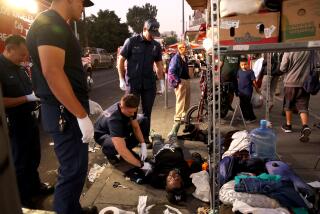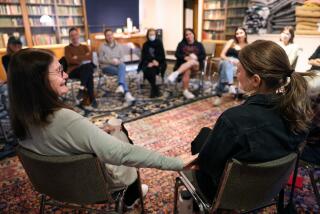Suicide Hot Line Volunteers Must Guard Against Caring Too Much
SAN FRANCISCO — In a cramped office above a tattoo parlor, a neatly dressed young man answers the telephone after one ring: “Suicide hot line. This is Frank. How can I help you?”
On the other end of the phone, a trembling female voice launches into a detailed account of heroin addiction and poverty.
After 55 hours of training, this is Frank’s first day answering phones at the San Francisco Suicide Prevention Center. The 23-year-old psychology student is both eager and apprehensive, wanting to help but afraid to make a mistake. He lets the caller do most of the talking and eventually refers her to a drug-treatment center.
When his four-hour shift ends, Frank discusses the day’s experiences with his counselor, Mark, an electrician and two-year hot line veteran.
“There are no ‘shoulds,’ ” Mark tells Frank. “It’s all up to you. But remember that you cannot solve all of their problems. You’re not their drug counselor. You’re not their therapist.”
When Frank says he might review all of his calls and remember their names and case histories, Mark responds, “Sure, if you want to drive yourself crazy.”
Mark and Frank are just two of more than 250 trained volunteers who have chosen to spend some of their spare time answering San Francisco’s 24-hour suicide and crisis line. Receiving 200 calls a day, 80,000 calls a year, they help some of the city’s most desperate people simply by listening.
But how do they deal with hour after hour of misery and lament without becoming miserable themselves? Several staffers recently discussed their on-the-job tensions and coping mechanisms, asking that they be identified only by their first names.
David, a full-time staffer who has been answering phones since 1983, recounted that a woman called and said she had swallowed a bottle of pills and would die when the sun rose.
“I kept her on the phone as long as I could, but she faded off. When the sun came up I knew that I had lost her. I was very upset and walked around in a daze for several days.”
“Now,” said David, “I leave the callers at the door when I go home. This is a job like any other. I can’t save these people. I do what I can but I give them credit for solving their own problems.”
Most volunteers agree that emotional distance is the only means they have of protecting themselves. Said Bob, a 35-year-old student, “I have callers inviting me over for Thanksgiving dinner. It’s not going to help to think about them all of the time. But there is a fine line between professionalism and seeing these people as a separate species.”
Alfred, who works in a home for mentally disturbed adults, is more cynical in his assessment of his hot line position. Happily completing his last day of a year of answering phones, he said, “None of these callers are my friends. And I think this really appeals to the most egotistical side of ourselves. The callers are encouraged to revel in their depression and self pity and we become these gurus with all of the solutions.”
Alfred’s comments immediately evoked good-natured rebuttals from his colleagues.
“Come on,” Mary said. “It’s not like we have messiah complexes.” The consensus seemed to be that Alfred should lighten up.
Maintaining a healthy sense of humor is part of the self-protection. Between phone calls, volunteers munch on doughnuts and chips and joke about stale coffee and life insurance. Grinning and gossiping, they could pass for any group of office workers on a coffee break.
Then the phone rings. Chairs swivel into place, smiles turn into tight-lipped grimaces and boisterous voices are lowered to a whisper. The instinct for helping others takes over.
Nina volunteered 11 years ago after a disabling accident. “Not everyone can do this,” she said. “You have to be a good listener and you really have to care.”
Nina said she knows immediately if a caller is serious by the tone of his or her voice.
“When a caller’s voice is flat and shows no emotion, when he says, ‘I’m tired,’ or, ‘I don’t care,’ that’s when my adrenalin starts pumping.”
Nina said she acknowledges the callers’ right to commit suicide, but she also invites them to talk out their problems with her.
Nina also knows when she has made a difference. “When that voice lightens and they chuckle when they didn’t want to chuckle, I know that I have helped.”
After the center opened in 1962, San Francisco’s suicide rate declined from 33 in every 100,000 residents to 16 per 100,000.
Although the rate has risen again in recent years because of demographic changes, the AIDS epidemic and waning government funding for mental health facilities, the volunteers remain determined to carry out their mission.
“We feel like the kid who has his finger in the dike in Holland,” said the hot line’s executive director, Eve Meyer. “The only way to really know if we’re helping is to pull the finger out. And we don’t want to do that.”
More to Read
Sign up for Essential California
The most important California stories and recommendations in your inbox every morning.
You may occasionally receive promotional content from the Los Angeles Times.










